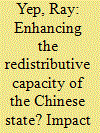|
|
|
Sort Order |
|
|
|
Items / Page
|
|
|
|
|
|
|
| Srl | Item |
| 1 |
ID:
103911


|
|
|
|
|
| Publication |
2011.
|
| Summary/Abstract |
China's rural village elections have been acclaimed as a crucial step in China's democratization and a success in improving villagers' welfare and self-governance. Around 2002 the central government implemented another influential reform: the Tax-for-Fee reform. Using a unique two-year panel of village data from rural China covering more villages than the previous literature and spanning over these two reforms, our dual-goal in this paper is, first to evaluate the impact of village election on local governance, and second to examine the potential interplay between the Tax-for-Fee reform and the village election. We show empirically that village elections do bring about positive consequences, including the enhancement of public expenditure and the improvement in efficiency in public administration, through the check and balances provided by the villagers' representatives meetings. However, the improvement in administrative efficiency has been partly unexpectedly attenuated by the Tax-for-Fee reform. We argue that this conflict is possibly due to the Tax-for-Fee reform's tightening up the villages' budget and that with sticky administration costs, the reduction of administrative share in total expenditure has been weakened. Therefore the tax reform undermines the functioning of village democracy.
|
|
|
|
|
|
|
|
|
|
|
|
|
|
|
|
| 2 |
ID:
081530


|
|
|
|
|
| Publication |
2008.
|
| Summary/Abstract |
Many observers contend that fiscal deprivation of the centre in reform China is detrimental to the overall capacity of the Chinese state, and thus the danger of national disintegration cannot be discarded. One relevant concern here is the obligation of the state to redress socio-economic dislocations, of which growing regional inequality is a major issue. The Tax Sharing Scheme introduced in 1994 represents the most colossal effort to redress the centre-local imbalance. The analysis of the patterns of income and expenditure of county finance between 1993 and 2002, however, highlights the many facets of state capacity and reiterates the possibility of state involvement amidst an improved fiscal position. The success in extractive capacity in this case does not guarantee parallel improvement in the central government's redistributive capacity. Analysis of local expenditure patterns shows that the growing support of the centre simply fails to reverse the declining level of local services in areas that may be targeted as key for poverty alleviation and equalization. The danger of the simple reading of the rise in extractive capacity attributed to the 1994 reform as a symptom of a strong central state is evident.
|
|
|
|
|
|
|
|
|
|
|
|
|
|
|
|
| 3 |
ID:
133635


|
|
|
|
|
| Publication |
2014.
|
| Summary/Abstract |
IT'S TOO SOON to pop the champagne corks. Europe, mired in gloom for years, still faces many high hurdles to resolve its crisis. Nonetheless, there are some auguries of prosperity that might invite a stockpiling of party hats and noisemakers. In December 2013, Ireland successfully emerged from its bailout, and Portugal followed this May. This verifiable progress represented a first for members of Europe's struggling periphery. But this news should only lift spirits so high. If these financial gains make anything clear, it is the need now to go beyond budget control to more fundamental and structural economic reform. Ireland's finance minister, Michael Noonan, summed up the situation well, characterizing his nation's emergence from the bailout as a "milestone," not the "end of the road." To secure their economic and financial future, Ireland, Portugal, the rest of Europe's periphery and France (which increasingly resembles the periphery) will have to reform long-standing labor, product and tax practices, and even industrial structures, to promote rather than impede organic growth. These nations must do nothing less than reshape the political-economic models under which they have operated for decades.
|
|
|
|
|
|
|
|
|
|
|
|
|
|
|
|
| 4 |
ID:
163512


|
|
|
|
|
| Summary/Abstract |
In 1994, after a period of substantial fiscal decentralization that has been credited with leading to historically unprecedented growth rates but significant fiscal decline, China introduced a new fiscal system that recentralized the collection of tax revenues. The economic and political consequences of this new Tax Sharing System (TSS) have been debated extensively in the literature, especially because of the renewed interest in fiscal federalism and its interaction with political institutions and economic outcomes. The question central to this debate has been whether the TSS constitutes a significant departure from decentralization with adverse effects on fiscal federalism or whether the recentralization of revenues under the TSS corrects for the overshooting in decentralization with beneficial economic outcomes. This paper exploits the staggered introduction of the TSS across regions and over time for econometric identification purposes and finds robust causal evidence that the TSS had a positive impact on economic outcomes.
|
|
|
|
|
|
|
|
|
|
|
|
|
|
|
|
| 5 |
ID:
187799


|
|
|
|
|
| Summary/Abstract |
We investigate the causality between government fiscal stress and the formation of zombie firms. We use the province-managing-county reform recently initiated in China to exogenously identify the change in financial pressures of local governments. Matching industrial firm data and county economic data from 1999 to 2013, we carry out difference-in-differences estimation and find that the possibility of zombie firms' formation significantly decreases after the reform. Specifically, the suppression effect is more pronounced in counties with low level of initial economic development, more debt stocks, poor financial situations, and high employment pressures. Further, the mechanism analysis shows that the reform improves firms' performance, such as productivity and profitability, through the decline of tax burden, which inhibits the formation of zombie firms. Our study contributes to a profound understanding of the causes of zombie firms in a large transition economy.
|
|
|
|
|
|
|
|
|
|
|
|
|
|
|
|
| 6 |
ID:
182845


|
|
|
|
|
| Summary/Abstract |
The colonial history of Tunisia has long been dictated by colonial sources that made the qaid (an official in charge of fiscal attributions), from the viewpoint of the capital city, a local notable and often a prevaricator. This study proposes to reconsider the relationship between government and regional power in the colonial context by drawing on the recent work of Ottoman studies about provincial elites. The article studies the fiscal reforms of the interwar period in a cereal-growing region of Tunisia, relying on sources in Arabic produced by the qaids, namely the administrative correspondence between local authorities, the prime minister, and colonial controllers. This article describes the role of qaids in the negotiation between national law and local specificities and finally highlights the role of decentralization and a local way of thinking about the state in the 1930s. It contributes to colonial history and the history of taxation by highlighting the territorial fractures in North Africa and the agency of local actors under the protectorate.
|
|
|
|
|
|
|
|
|
|
|
|
|
|
|
|
|
|
|
|
|